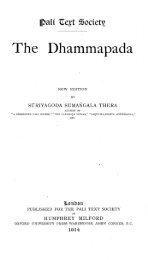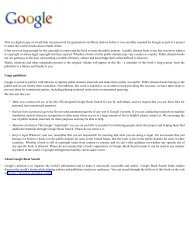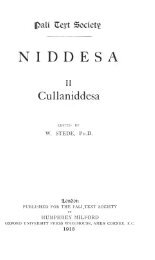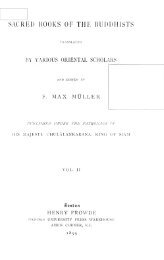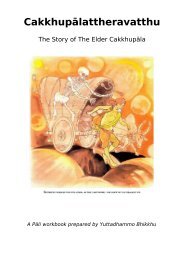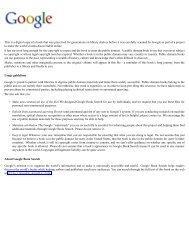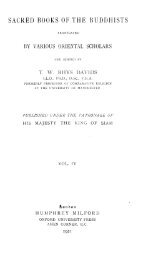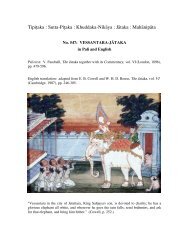Lessons In Practical Buddhism - Sirimangalo.Org
Lessons In Practical Buddhism - Sirimangalo.Org
Lessons In Practical Buddhism - Sirimangalo.Org
Create successful ePaper yourself
Turn your PDF publications into a flip-book with our unique Google optimized e-Paper software.
suffering that comes to the recipient of criticism is also<br />
common to those who cling to an idea of self. For those who<br />
have practised insight meditation, however, there comes the<br />
knowledge that what we call “self” is only a flux of<br />
experience, arising and ceasing, and so there is no target on<br />
which to pin such criticism. The criticism itself is not real,<br />
either; it is only speech that is interpreted by our mind as<br />
having some sort of meaning, leading to thoughts and that<br />
are then clung to as pleasant or unpleasant; the meditator<br />
will see this, and find nothing in the process that can be said<br />
to belong to oneself, freeing them from the burden of such<br />
criticism.<br />
Moreover, through the practice of meditation, one will cease<br />
to perform any and all evil deeds, and therefore find no<br />
reason to fear what others might say. As my teacher once<br />
joked with us, “if someone calls you a buffalo, just put your<br />
hand on your backside and see if you have a tail. If you<br />
don’t have a tail, you’re not a buffalo.” The only sure way to<br />
be free from blame of others is to avoid evil deeds of<br />
thought, speech and deed. Then, even when others scold or<br />
criticize you, you will not be moved, since you see clearly<br />
that you have done nothing wrong, and that the criticism is<br />
just meaningless speech.<br />
If we are not mindful when others praise us, we will be<br />
delighted, conceiving it to be pleasurable and clinging to it<br />
as belonging to us. Then, when others even hint at dispraise<br />
or criticism, we will be angered, displeased, even depressed<br />
and traumatized thinking the criticism also ours. It is this<br />
danger that the Buddha saw when he said in the Mangala<br />
Sutta, “phutassa lokadhammehi, cittaṃ yassa na khampati”<br />
– when touched by worldly vicissitudes, whose mind is not<br />
shaken, for them this is the highest blessing. So, we should<br />
take every precaution to ward off the danger in clinging to<br />
both the criticism and the praise of others.<br />
At the same time, we should make all effort to avoid evil<br />
deeds or else even wise people will criticize us. Even if we<br />
are not moved by criticism, still our evil deeds will always<br />
meet with censure by the wise, and we will thus have no<br />
opportunity to associate with good people who will regard us<br />
as evil doers. This is a real danger that comes from evil –<br />
17



